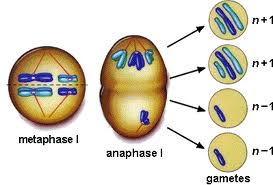18. Mosaicism: a condition in which an organism or part is composed of two or more genetically distinct tissues owing to experimental manipulation or to faulty distribution of genetic material during
19. Non-disjunction: the failure of chromosomes to separate and segregate into daughter cells at division.
20. Polyploidy: Having extra sets of chromosomes
21.Reciprocal cross: hybridization involving a pair of crosses that reverse the sexes associated with each genotype
22. Sex chromosome: a chromosome, differing in shape or function from other chromosomes, that determines
23. Syndrome: a group of symptoms that together are characteristic of aspecific disorder, disease, or the like.

24. Translocation: a chromosomal rearrangement in which a segment of genetic material from one chromosome becomes heritably linked to another chromosome.
25. X chromosome: a sex chromosome of humans and most mammals that determines femaleness when paired with another X chromosome and that occurs singly in males.
26. Y chromosome: a sex chromosome of humans and most mammals that is present only in males and is paired with an X chromosome.
1. abortion: any of various surgical methods for terminating a pregnancy, especially during the first six months.
2. Anueploidy : having a chromosome number that is not an exact multiple of the haploid number, caused by one chromosome set being incomplete
3. Autosome: any chromosome other than a sex chromosome.
4. Crossing over: the interchange of sections between pairing homologous chromosomes during the diplotene stage of meiosis
5. Deletion : a type of chromosomal aberration in which a segment of the chromosome is removed or lost
6. Disease: a disordered or incorrectly functioning organ, part, structure, or system of the body resulting from the effect of genetic or developmental errors, infection, poisons, nutritional deficiency or imbalance, toxicity, or unfavorable environmental factors; illness; sickness; ailment.
7. double-blind study : an experimental procedure in which neither the subjects of the experiment nor the persons administering the experiment know the critical aspects of the experiment
8. duplication: a type of chromosomal aberration in which a region of the chromosome is repeated.
9. genetic abnormality : a disease or disorder that is inherited genetically
10.genetic disorder: a disease or disorder that is inherited genetically
11. genetic recombination: is a process by which a molecule of nucleic acid (usually DNA, but can also be RNA) is broken and then joined to a different one
12.homologous chromosome: one of a pair of chromosomes that match up at meiosis and are identical in morphology and arrangement
13. in-vitro fertilization: clinics will offer a partial refund if you don't become pregnant after a so many attempts
14.Independent assortment: The process of random segregation and assortment of chromosomes during anaphase I of meiosis resulting in the production of genetically unique gametes.
15. Inversion: a type of chromosomal aberration in which the position of a segment of the chromosome is changed in such a way that the linear order of the genes is reversed.
16. Karyotype: the chromosomes of a cell, usually displayed as a systematized arrangement of chromosome pairs in descending order of size.
17. Linkage group: a group of genes in a chromosome that tends to be inherited as a unit.

























No hay comentarios:
Publicar un comentario